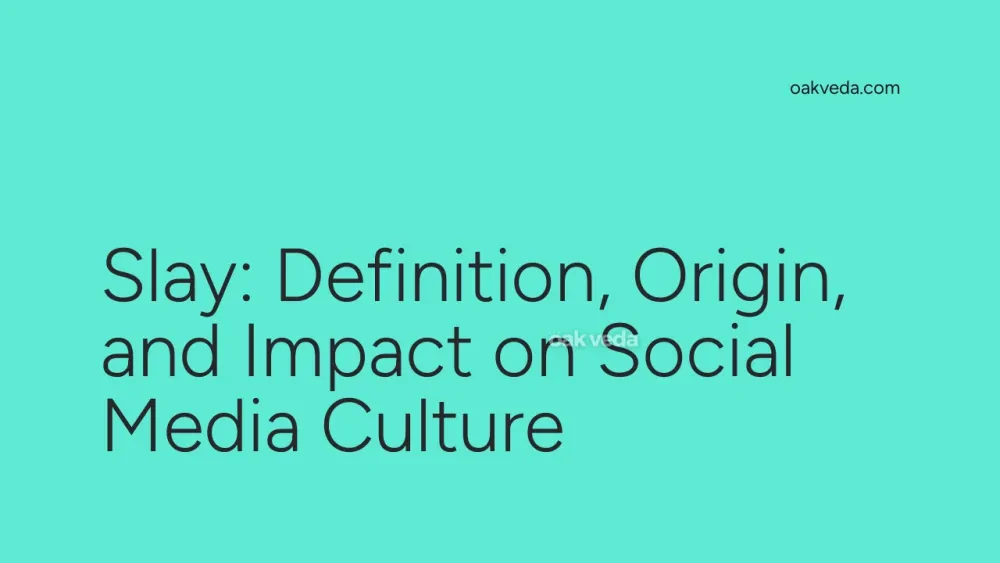
What is Slay?
"Slay" is a popular slang term used across social media platforms to express admiration, praise, or encouragement for someone who has performed exceptionally well or achieved something impressive. In essence, to "slay" means to excel or succeed in a remarkable way, often surpassing expectations.
Origin and Development of Slay
The term "slay" has its roots in the African American LGBTQ+ community, particularly within the ballroom culture of the 1980s and 1990s. Originally used to compliment exceptional performances in drag shows and dance competitions, "slay" has since evolved and found its way into mainstream social media vernacular.
The ballroom scene, prominently featured in the documentary "Paris Is Burning" (1990) and the TV series "Pose" (2018-2021), played a crucial role in popularizing "slay" and other related terms. As LGBTQ+ culture gained more visibility and acceptance, the language of the ballroom scene, including "slay," began to permeate popular culture.
How Slay Works in Social Media Context
On social media, "slay" functions as a versatile term of praise and empowerment. Users employ it in various ways:
- As a verb: "She slayed that performance!"
- As an interjection: "Slay, queen!"
- As a noun: "That outfit is a total slay."
The term is often accompanied by emojis like the crown (👑), fire (🔥), or sparkles (✨) to emphasize its positive connotation.
Popular Examples of Slay on Social Media
- Fashion and Beauty: Influencers and celebrities often receive "slay" comments on their outfit posts or makeup looks.
- Music and Performance: Fans use "slay" to praise their favorite artists' performances or new releases.
- Personal Achievements: Users might caption their own success stories with "slay," or friends might use it to congratulate each other.
- Activism: The phrase "slay the patriarchy" has gained traction in feminist discourse online.
Impact of Slay on Social Media Culture
The widespread use of "slay" on social media has had several notable impacts:
- Empowerment: "Slay" serves as a tool for self-expression and mutual encouragement, fostering a culture of positivity and support.
- Inclusivity: The term's origins in LGBTQ+ culture have helped promote awareness and acceptance of diverse communities.
- Language Evolution: "Slay" exemplifies how social media accelerates the adoption and evolution of slang terms.
- Cross-Cultural Exchange: As a globally used term, "slay" demonstrates the power of social media in spreading cultural phenomena.
Controversies Surrounding Slay
While generally positive, the use of "slay" has faced some criticism:
- Cultural Appropriation: Some argue that the mainstream adoption of "slay" divorces it from its LGBTQ+ and African American roots.
- Overuse: Critics suggest that excessive use of the term may dilute its impact or make it feel insincere.
- Generational Divide: Older generations may find the term confusing or unnecessary, leading to potential communication gaps.
How Brands and Influencers Use Slay
Savvy brands and influencers have incorporated "slay" into their social media strategies:
- Engagement Boosting: Using "slay" in captions or comments to connect with younger audiences.
- Product Marketing: Describing products as "slay-worthy" or encouraging customers to "slay" with their offerings.
- Campaign Hashtags: Creating branded hashtags like #SlayAllDay or #SlayTheLook for user-generated content campaigns.
- Influencer Collaborations: Partnering with influencers who frequently use "slay" to reach their engaged followers.
Future Trends Related to Slay
As social media language continues to evolve, we can expect:
- New Variations: Like "snatched" evolved from "slay," new related terms may emerge.
- Global Adoption: Increased use of "slay" in non-English speaking countries and potential translations.
- AI and Chatbots: Integration of "slay" and similar slang into AI-powered customer service to sound more relatable.
- Academic Interest: More scholarly research on the linguistic and cultural significance of terms like "slay."
FAQs about Slay
-
Is "slay" only used for women? No, while it originated in LGBTQ+ culture, "slay" is now used for people of all genders.
-
Can "slay" be used sarcastically? Yes, like many slang terms, "slay" can be used ironically or sarcastically, depending on the context.
-
Is it appropriate to use "slay" in professional settings? It's generally best to avoid slang like "slay" in formal professional contexts, unless the workplace culture explicitly embraces such language.
-
How do you use "slay" in a sentence? Examples include: "You're going to slay that job interview!" or "Her performance absolutely slayed."
-
Is "slay" here to stay? While slang terms often have a limited lifespan, "slay" has shown remarkable staying power and continues to be widely used across social media platforms.
In conclusion, "slay" has transcended its origins to become a powerful and positive force in social media culture. Its journey from ballroom slang to mainstream empowerment tool illustrates the dynamic nature of language in the digital age. As social media continues to shape how we communicate, terms like "slay" serve as bridges between communities, generations, and cultures, fostering a more inclusive and supportive online environment.
You may be interested in:
- Social Media Management: Definition, Origin, and Impact
- Lookalike Audience: Definition, Origin, and Impact
- Go Live: Definition, Origin, and Impact on Social Media
- Doing It for the Gram: Definition, Origin, and Impact
- Link Tree: Definition, Origin, and Impact on Social Media
- Sliding into DMs: Definition, Origin, and Impact

